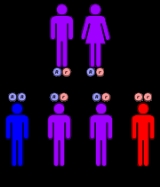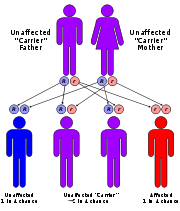
Ablepharon macrostomia syndrome
Encyclopedia
Ablepharon macrostomia syndrome (AMS) is an extremely rare autosomal
recessive genetic disorder
characterized by malformations of the skull
, skin, fingers and genitals. Affected individuals may also have malformations of the nipples and abdominal wall.
Younger individuals might experience language difficulties, and in some instances mental retardation
is known.
 It has been suggested that AMS is inherited in an autosomal recessive manner. This means the defective gene responsible for the disorder is located on an autosome
It has been suggested that AMS is inherited in an autosomal recessive manner. This means the defective gene responsible for the disorder is located on an autosome
, and two copies of the defective gene (one inherited from each parent) are required in order to be born with the disorder. The parents of an individual with an autosomal recessive disorder both carry
one copy of the defective gene, but usually do not experience any signs or symptoms of the disorder.
Autosome
An autosome is a chromosome that is not a sex chromosome, or allosome; that is to say, there is an equal number of copies of the chromosome in males and females. For example, in humans, there are 22 pairs of autosomes. In addition to autosomes, there are sex chromosomes, to be specific: X and Y...
recessive genetic disorder
Genetic disorder
A genetic disorder is an illness caused by abnormalities in genes or chromosomes, especially a condition that is present from before birth. Most genetic disorders are quite rare and affect one person in every several thousands or millions....
characterized by malformations of the skull
Human skull
The human skull is a bony structure, skeleton, that is in the human head and which supports the structures of the face and forms a cavity for the brain.In humans, the adult skull is normally made up of 22 bones...
, skin, fingers and genitals. Affected individuals may also have malformations of the nipples and abdominal wall.
Younger individuals might experience language difficulties, and in some instances mental retardation
Mental retardation
Mental retardation is a generalized disorder appearing before adulthood, characterized by significantly impaired cognitive functioning and deficits in two or more adaptive behaviors...
is known.
Genetics

Autosome
An autosome is a chromosome that is not a sex chromosome, or allosome; that is to say, there is an equal number of copies of the chromosome in males and females. For example, in humans, there are 22 pairs of autosomes. In addition to autosomes, there are sex chromosomes, to be specific: X and Y...
, and two copies of the defective gene (one inherited from each parent) are required in order to be born with the disorder. The parents of an individual with an autosomal recessive disorder both carry
Genetic carrier
A genetic carrier , is a person or other organism that has inherited a genetic trait or mutation, but who does not display that trait or show symptoms of the disease. They are, however, able to pass the gene onto their offspring, who may then express the gene...
one copy of the defective gene, but usually do not experience any signs or symptoms of the disorder.
Symptoms
- Absent/short eyelids
- Absent eyebrows
- Absent eyelashes
- External ear abnormalities
- AlopeciaAlopeciaAlopecia means loss of hair from the head or body. Alopecia can mean baldness, a term generally reserved for pattern alopecia or androgenic alopecia. Compulsive pulling of hair can also produce hair loss. Hairstyling routines such as tight ponytails or braids may induce Traction alopecia. Both...

